OUT OF LIBYA
2011-12-07DINGYING
China completes a historic evacuation of 35,860 Chinese citizens from Libya within days
By DING YING
February 18 was a bad day for 37-year-old Deng Chaoyong.That night, a group of Libyan looters raided the Chinese hydropower giant Sinohydro Corp.’s building site in Benghazi, a port city in northeast Libya, where Deng had been working for the past six months.
“Our manager told us to stay calm and let them take whatever they wanted as long as they didn’t hurt us. But after looting everything possible, they drove our cars toward us and shot at us,” said Deng a week later in a hotel on the island of Crete, in south Greece.
He was shot in both legs and one shoulder during the raid. After being carried to a hospital in Benghazi on self-made stretchers,Deng and his injured colleagues found no doctor there.
“We stayed there for three days and barely got treatment,” Deng recalled. “Then the situation became even worse. I thought I would die there.”
Fortunately, Deng and other Chinese citizens in Libya were taken to Crete on chartered vessels on February 24. “Thanks to our government, we are safe now,” he told Xinhua News Agency. One day later, Deng arrived in Beijing and got treatment.
Deng was one of more than 30,000 Chinese citizens trapped in riot-torn Libya.Within just a few days, China conducted its biggest evacuation ever to get them home from the North African country.
Danger
Libya is the world’s eighth largest oil producer. Before riots broke out, many foreign employees, including those from Asia,worked in the country. Reports said there were about 60,000 Bangladeshi, 10,000 Vietnamese, 30,000 Filipinos, 23,000 Thais and 20,000 Indians.
Statistics from China’s Ministry of Commerce (MOFCOM) show there were around 36,000 Chinese in Libya before the riots. Most of them were employees of Chinese enterprises that had contracts in the country. Altogether, 75 Chinese enterprises had 50 projects there, with a total value of more than $20 billion. Most projects were labor-intensive, in fields such as construction,railways, oil exploration and telecommunications.
After the situation in Libya deteriorated on February 16 with the start of widespread riots,many Chinese enterprises were raided and robbed. MOFCOM said on February 24 that 27 Chinese building and residential sites were attacked, with 15 Chinese employees seriously injured. Looters robbed Chinese workers of their cars, computers, cellphones, cash, construction machinery and office facilities, and set fires. Losses exceeded $1.5 billion, said MOFCOM.
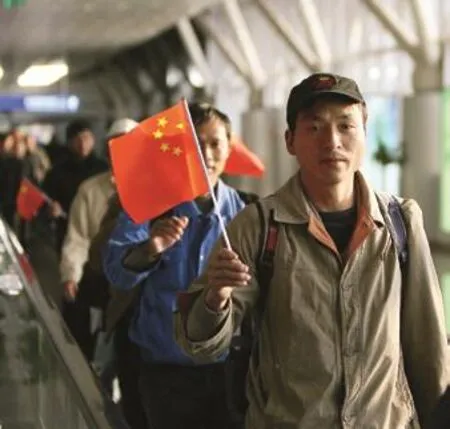
HOMECOMING: Chinese evacuees from Libya arrive at the Beijing Capital International Airport on February 27

BON VOYAGE: China’s Ambassador to Turkey Gong Xiaosheng (left) supervises the evacuation operations at Istanbul’s airport. On the night of March 1, a total of 982 evacuees from Libya left the airport to return to China on five planes
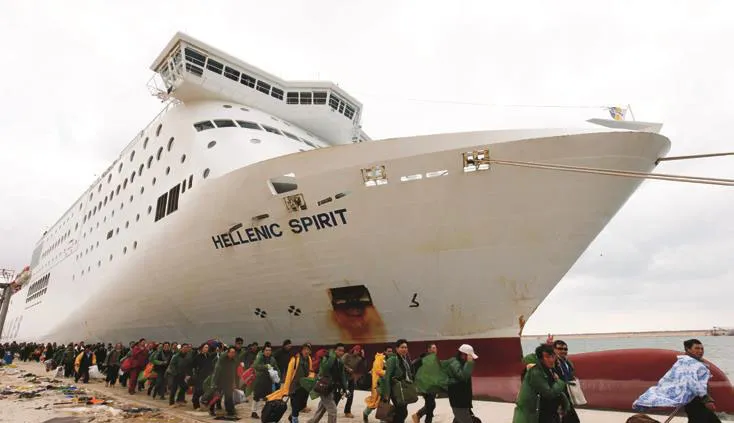
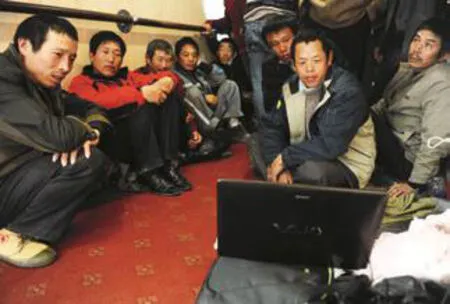
JOY OF THE JOURNEY:Passengers watch movies on a laptop aboard the Greek vessel Hellenic Spirit on February 26. More than 4,200 Chinese,Vietnamese and Bangladeshi nationals were evacuated that day from Libya on two Greek vessels chartered by the Chinese Government
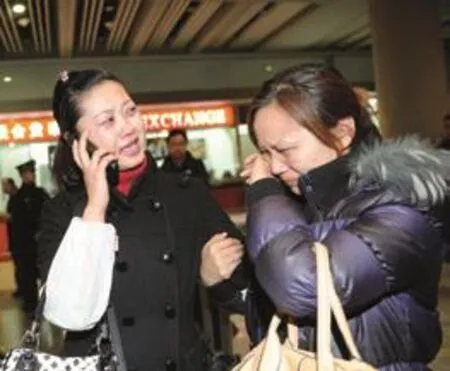
SAFE ARRIVAL:Tang Fang (left),an evacuee from Libya, calls her family after arriving in Beijing on a charter plane on February 25
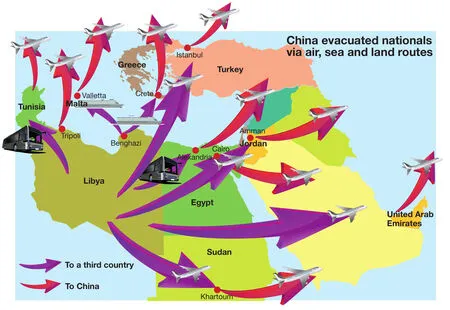
Given the volatile situation in Libya,China knew it was a must to withdraw its citizens as quickly as possible.
Chinese President Hu Jintao and Premier Wen Jiabao issued an order on February 22,requiring all departments involved to try their best to guarantee the safety of Chinese nationals in Libya. The State Council, China’s cabinet,set up an emergency headquarters headed by Vice Premier Zhang Dejiang to coordinate and organize the evacuation operation.
Withdrawal
As of March 2, a total of 35,860 Chinese citizens had been evacuated from Libya.This meant all Chinese who desired to go home and whose whereabouts were known by the Foreign Ministry had been evacuated,said Vice Foreign Minister Song Tao.
It was the largest and most complicated overseas evacuation ever conducted by the Chinese Government since the People’s Republic of China was founded in 1949, he said.
An Huihou, a research fellow with the Chinese Institute of International Studies(CIIS), said, unlike previous evacuations,this evacuation involved tens of thousands of people. Therefore, it was impossible to finish the job by sending planes alone. Riots in Libya also created trouble for the evacuation.Organizing so many people was another big task—most of them needed to be transported to China via third countries.
Since most Chinese enterprises in Libya were involved in infrastructure construction projects, their employees lived in vast areas with no power supply and poor telecommunications. The fact that about 95 percent of Libya is desert or semi-arid areas added to the difficulties of the evacuation.
International affairs commentator Hong Lin, however, listed several advantages. For example, Libya lies across the Mediterranean Sea from Greece, Italy and Spain, all of which have large shipping fleets, with vessels available for China to charter. Since China currently has no direct flights to Libya, and it would be difficult to set up temporary routes,chartered foreign ships played a significant role during this evacuation.
Chinese enterprises operating in Libya are mostly large enterprises such as the China State Construction Engineering Corp., the China Railway Group Ltd. and PetroChina Co. Ltd.These companies have ample overseas working experience and good management, which all helped in organizing the evacuation, Hong said.
Gao Zugui, Director of the Institute of World Political Studies at the China Institutes of Contemporary International Relations (CICIR), noted this evacuation was a test of China’s evacuation mechanism.China’s last major evacuation was during the recent turmoil in Egypt, when China pulled out some 1,800 citizens.
During the evacuation from Libya, the Chinese Government evacuated nationals via air, sea and land routes.
On February 23, the Civil Aviation Administration of China (CAAC) sent its first chartered plane to Libya’s capital Tripoli to return evacuees to China. Since most evacuees had been transferred to third countries, such as Egypt, Greece, Malta,Tunisia, Jordan, Sudan and Turkey, CAAC dispatched flights to aid the evacuation.
Beginning March 1, CAAC dispatched 20 flights every day. Among these, Air China and China Southern Airlines both sent six flights a day. China Eastern Airlines and Hainan Airlines sent five and three flights, respectively.
China’s Air Force also dispatched four cargo planes to Libya to get evacuees to Sudan’s capital Khartoum. In addition,China’s Foreign Ministry chartered planes from other countries to aid the withdrawal.
Most Chinese nationals were evacuated from Libya by ship, however. After coordinating with the Chinese Embassy in Greece, Greece sent seven chartered vessels to Benghazi. Evacuees were then transferred to Crete before they headed for China. Each Greek vessel transferred about 2,000 people each voyage. Malta also sent chartered vessels to transport Chinese citizens to its port city of Valletta.
The China Ocean Shipping (Group) Co.and the China Shipping (Group) Co. directed their ships in nearby waters to participate in the evacuation as well. In addition, the Chinese Navy sent a frigate from its antipiracy escort fleet in the Gulf of Aden to protect the vessels.
Chinese evacuees also took overland routes to escape Libya, by traveling to Tubruq, near the Libya-Egypt border. Then they entered Egypt through the Egyptian city of Salum. The first group of 83 Chinese escaped Libya this way. The Chinese Embassy in Egypt organized more than 100 buses to wait in Salum to transport possible evacuees.
In the mean time, the Chinese Ministry of Transport issued an emergency notice calling on all transportation departments at home to cooperate with CAAC, to offer efficient service to the evacuees when they returned to China.
Significance
Analysts pointed out that the operation was not only a big success for China’s evacuation mechanism, but also a big success for China’s diplomacy.
Dong Manyuan, Director of the Department for International Strategic Studies at the CIIS, said the evacuation showed China now has more resources and means to protect the safety of its nationals overseas. It also marked a new phase in China’s efforts to protect its nationals’ interests and deal with emergencies overseas.
The Hong Kong-based newspaper Ta Kung Pao said a country’s ability to protect its citizens overseas reflects its national strength and influence in the world. The evacuation also highlighted China’s peoplefirst diplomacy.
With the development of China’s economy and international cooperation, more and more Chinese companies have established an overseas presence. The successful evacuation proved the Chinese Government’s firm support for the companies’ efforts to reach out to the global market, said Xia Liping, a professor at the China Foreign Affairs University.
Unlike releasing early warning information or opening consular protection hotlines,evacuation is the last step when facing emergencies and unexpected incidents, said Li Wei, Director of the Institute of Security and Strategic Studies at the CICIR. He noted strengthening consular protection and protecting the interests of overseas nationals are new aspects of China’s diplomacy.
China’s consular protection mechanism has become mature after being tested by tough tasks, said Huang Ping,Director General of the Foreign Ministry’s Department of Consular Affairs. Over the past five years, the Chinese Government has evacuated a large number of Chinese citizens overseas during a number of similar events.
The Department of Consular Affairs set up a division for consular protection in May 2006. In August 2007, it upgraded the division to the Center for Consular Assistance and Protection. The center is responsible for providing consular protection and assistance for overseas Chinese while issuing early warnings and relevant information.
As early as 2004, China’s State Council established a ministerial-level joint conference system for the protection of Chinese citizens and agencies abroad. Chinese diplomatic missions abroad have also established emergency response plans. These initiatives enable various ministries and departments cooperate with each other.
For example, the Ministry of Foreign Affairs, the State-owned Assets Supervision and Administration Commission of the State Council, the Ministry of Transport, the Ministry of Commerce, CAAC and relevant military departments jointly achieved great results by concentrating all possible means of transportation to get the evacuees out of Libya and return them to China.
In addition, many evacuees lost their valid IDs in riots, but coordination among the Ministry of Foreign Affairs, the Ministry of Public Security and the General Administration of Customs helped them by simplifying entry procedures.
Tang Zhichao, Deputy Director of the Institute of Asian and African Studies at the CICIR, said the evacuation showed the quick response, high efficiency and orderly coordination of the Chinese Government.
Tang of the CICIR noted that many countries, especially Greece, Tunisia,Egypt, Malta, Turkey and Jordan, offered China great help during the evacuation,reflecting China’s good relationships with them. This also proved the success of China’s independent foreign policy of peace, which the country should unswervingly pursue.
On February 27, on behalf of the Chinese Government and its people,Premier Wen sent messages of gratitude to the Greek and Maltese governments for their support and help in evacuating Chinese nationals from Libya. On March 1, Foreign Minister Yang Jiechi called his counterparts in Jordan, Turkey, Sudan and the United Arab Emirates to express his appreciation for their assistance and support during the evacuation.
Chinese companies in Libya also hired hundreds of employees from Viet Nam, the Philippines, Nepal and Bangladesh. China helped evacuate these foreign employees as well for humanitarian reasons.
As of March 2, China had evacuated about 2,100 citizens for 12 foreign countries.
Guo Shaochun, Deputy Director General of the Foreign Ministry’s Department of Consular Affairs, said, “In any circumstances, they will not be left alone. This is our promise to them.” ■
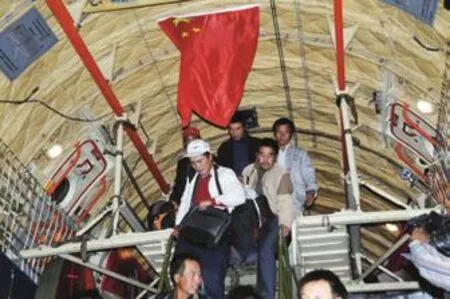
MULTI-PRONGED OPERATION: A Chinese Air Force cargo plane transfers 250 Chinese evacuees from Libya to Sudan’s Khartoum on March 2
